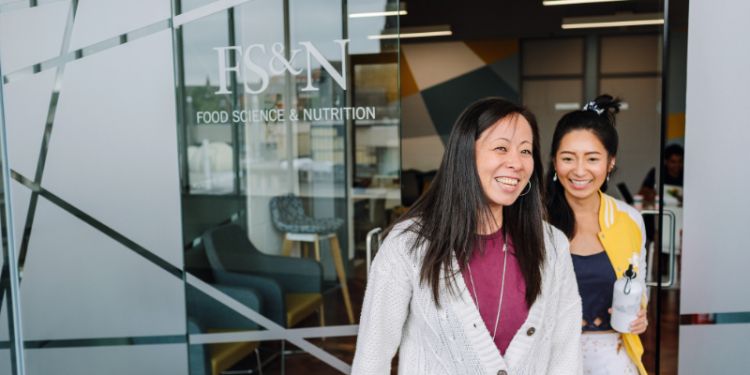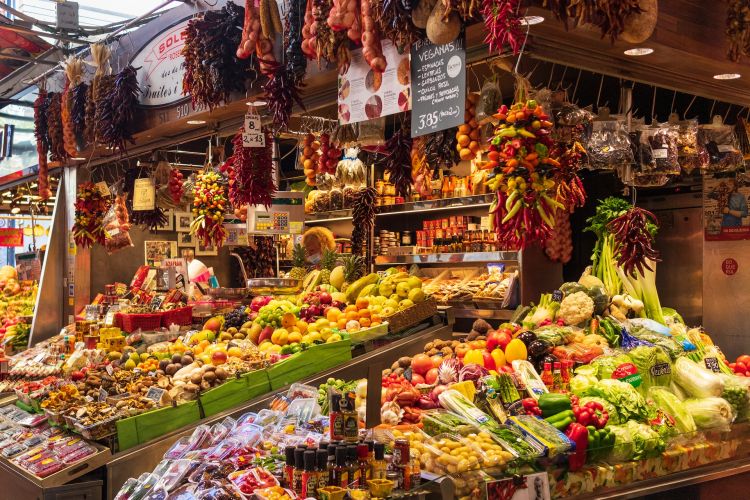Alternative protein research: transforming the UK’s commercial protein landscape

Scientists at the University of Leeds are leading research into sustainable, nutritious alternative proteins for food and feed. Find out what they’re working on with their industry partners.
In collaboration with the alternative protein industry, research and innovation in the Schools of Food Science and Nutrition and Biology supports sustainable nutrition, net zero, food security, gut health, allergy management, taste and texture and much more.
Their key areas of research include:
- structuring alternative proteins: techniques like microgelation, self-assembly and enzymatic hydrolysis
- protein and peptide discovery to support nutrition, allergy management and gut health
- green protein artificial intelligence
- natural potential: discovering proteins from plants, microbes, waste and more.
Here is an overview of the recent and upcoming projects in the alternative protein space at the University of Leeds.
Improving existing protein products
Plant-based burgers
This “Better Food Project” is a collaboration between STARS and the University of Leeds. It aims to develop a plant-based burger that mimics the taste and texture of a beef burger. It's a response to the growing demand from consumers who enjoy meat but want to reduce their intake due to its ethical and environmental issues.
Led by Dr Alan Javier Hernandez Alvarez, the project utilizes advanced food chemistry and processing technologies to cater to the UK's meat-loving population while offering a sustainable alternative.
Mycoprotein nutrition – Quorn Foods
Professor Brent Murray, Dr Rammile Ettelaie, Dr Simon D Connell and Professor Anwesha Sarkar are working with Quorn Foods and the Soft Matter for Formulation and Industrial Innovation (SOFI) Centre for Doctoral Training.
Their project will study mycoprotein, the protein used in all of Quorn’s products, and aims to add to its nutritional value.
Professor Murray has co-written research about the effects of adding micronutrients on mycoprotein.
- “Multivalent cations modulating microstructure and interactions of potato protein and fungal hyphae in a functional meat analogue” discusses the effects of calcium and ferric ions on mycoprotein. They tested them with and without added potato protein.
- “Understanding the microstructure of a functional meat analogue: Demystifying interactions between fungal hyphae and egg white protein” investigated the microstructure of mycoprotein with and without egg white protein.
The researchers suggest that when creating mycoprotein products, producers should balance pH and calcium to enable iron supplementation with minimal textural effects.
This work will support Quorn Foods to plan and produce their vegetarian and vegan products with optimal textural and nutritional performance.
Fortifying fibre-rich food with plant proteins
‘SusProFood’ is a project that supports industrial partners to improve the nutrition, sustainability and mouthfeel of their smoothies and savoury sauces.
The researchers will use innovative methods of alternative protein self-assembly creation to find the best way to incorporate protein into the products. They'll optimise heat, ions, shear and enzymes so as not to use new energy-intensive resources.
They will measure the potential of the food prototypes to improve people’s gut health.
In their paper published in Nature Communications, they show how alternative proteins can be self-assembled to improve their juiciness, without using chemical additives or harsh processing.
This project is being led by Professor Anwesha Sarkar, Professor Kieran Tuohy and Dr Anthony Buckley.
Professor Anwesha Sarkar is the Director of Research and Innovation in the School and the founder of Sarkar Lab, a laboratory which hosts leading scientists in alternative protein research. Its innovative toolkits include a 3D tongue-like surface and a MiniGut model.
Novel alternative proteins
Duckweed
Duckweed, the plant found in ponds and other bodies of water, could be a new source of plant protein and nutrition for humans.
Dr Idolo Ifie is the lead author of the paper “Processing techniques on phytochemical content, proximate composition, and toxic components in duckweed.”
They aim to create duckweed powder that can fortify food or be ingested as protein. Duckweed is up to 43% protein and it contains mineral nutrients, starch and fatty acids.
The plant has a high production rate and can grow in a wide variety of environments, making them sustainable and resilient to climate change. They do not require land or fertilizer for propagation.
Dr Ifie’s research contributes to nutritious diets that have low environmental impacts and improve the well-being of the population.

Yeast-based protein
Dr Célia Ferreira investigates innovative ways to nurture sustainable, nutritious alternative protein sources.
She partners with G's-Fresh, BioPower Technologies and AgriFoodX for her project “AdvanceYeastProt”. They are growing yeast-based food in bio-scaffolds to create structured, high-protein products.
They aim to create healthier foods that are affordable for everyone while reducing food waste.
Vegan eggs
Dr Alan Hernandez Alvarez and Professor Brent Murray recently completed a Knowledge Transfer Partnership with Plant Meat Ltd.
The expertise provided by the School of Food Science and Nutrition researchers supported Plant Meat Ltd, whose vegan products are known under the trademark THIS, to create a whole egg replacer that mimics the techno-functional properties of eggs in cooking
The partnership also offered the researchers an understanding of small and medium enterprises (SMEs) within the UK which they will incorporate in their teaching to Food Science and Nutrition students.
“The Plant Meat Ltd project aims to find alternatives to eggs, not just because some individuals are allergic. Relying on just eggs can mess with our food security; if something goes wrong in the egg supply, like a disease outbreak in hens, we're in trouble. Plant-based alternatives can be a safety net,” says Dr Alvarez.
“Plus, producing eggs has its environmental footprint, and if we can find sustainable plant alternatives, that's a win for Mother Earth. Not to mention, there's the whole aspect of treating animals better and reducing food waste.”
Plant-based nutrition and allergy management
High polyphenol Mediterranean-style diet
Together with collaborators across the world, Professor Kieran Tuohy supported one of the largest, most comprehensive and long-term dietary interventions with a plant-based, high polyphenol Mediterranean-style diet.
In a study of 300 pre-diabetic participants, the ‘DIRECT-PLUS’ study showed that replacing animal protein with plant-based protein and increasing plant polyphenols could reduce body weight, improve fat partitioning, reduce liver fat, reduce insulin resistance, reduce fasting morning stress hormones, slow biological ageing, protect against brain atrophy and slow brain ageing, regulate epigenetic control mechanisms and improve cardiovascular and metabolic health.
Professor Tuohy continues this research at Leeds and with collaborators across the UK and Ireland.
Is plant-based meat healthy?
Dr Alvarez works with The Good Food Institute Europe and other collaborators to discuss the health aspects of plant-based meats. He researches plant-based meat and health, how to make plant-based diets more accessible and the importance of research to further enhance the products.
Prophylactic immunotherapy for peanut allergy
In their paper, “Dose and route of administration determine the efficacy of prophylactic immunotherapy for peanut allergy in a Brown Norway rat model,” Dr Alan Mackie and co-authors explore allergen-specific immunotherapy.
They aimed to understand how allergens interact with the immune system depending on how they enter the body. The study discovered an effective dose and delivery of immunotherapy to prevent reactions.
Sustainability
Growing the UK’s alternative protein market
In collaboration with SPG Innovation and Baker Perkins, Dr Alan Hernandez Alvarez’s project focuses on exploring new, low-emission processes for creating textured vegetable proteins (TVPs).
The UK faces limitations in extrusion technology, which is crucial for producing TVPs.
This project aims to advance the UK's position in the alternative protein market by developing innovative products that are delicious and environmentally friendly.
Dr Alvarez and colleagues explore whole ingredients and by-products that are grown in the UK, emit lower emissions and are cost-effective. To do this, they need to develop technology to texturize diverse ingredients.
AI-optimised fermentation
The project “AI-Optimised Fermentation for Sustainable Protein Production from Food Side Streams” with Professor Nicholas Watson aims to address famine, climate change, gas emissions and food waste.
In this research, they use artificial intelligence (AI) and fermentation to recycle food waste from food manufacturers. They turn the waste into sustainable alternative proteins for human consumption.
The products they create will have low environmental impact, redirect food waste, contain fewer additives and go through less processing. They’ll be sold in innovative packaging that extends product shelf life and will be accessible in price.
Their partners include Commonwealth Scientific and Industrial Research Organisation (CSIRO) Australia Industry Partners: BioPower Technologies Mike Lewis SPC Kagome Australia.
Transforming crustacean shell proteins
Dr Christine Bosch and Dr Alan Hernandez Alvarez are part of the “CruSHH project: crustacean shell protein-derived peptides for heart health.”
The research explores the potential of waste from the seafood industry to become protein products that benefit human health.
They transform residual protein from crustacean shells into peptides with health-promoting effects like lowering blood pressure and glucose.
The researchers will try different methods of protein breakdown by changing the conditions of enzyme reactions. They’ll find optimal ways to preserve the health-promoting properties of the peptides.
This project will not only support heart health in humans but will also reduce biological waste in the seafood industry, improving its sustainability.
Sustainable feed for farmed animals
The Global Food and Environment Institute partner with Entocycle on a program which aims to unlock the growth of the UK insect farming industry.
A state-of-the-art insect-rearing facility, developed by the UK’s leading insect technology company Entocycle, will house the research. It’s situated at The National Pig Centre at the University of Leeds’ farm.
Currently, 75% of global soy production is used as protein in animal feed. Insect farming provides a low-carbon protein alternative by using less land area, less water and fewer fossil fuel-based materials per kilogram of protein produced.
Insects can be reared on the manure of farm animals and will, in turn, be used to feed them. This reduces both animal waste and the carbon cost of animal feed.
Through extensive and varied research, the University of Leeds and its partners are at the forefront of creating a future where delicious, sustainable and ethical food choices are available to everyone. As well as food science innovation, they make a positive impact on the planet and society.







